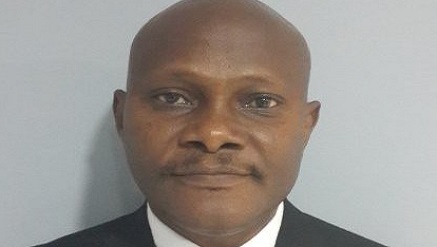E-Business
SAP Explains How GRC Unified Approach Mitigates Business Risks

Governance describes the activities that ensure business is done according to established standards and goals; however, risk involves strategically creating value and protecting value, said SAP.
According to Salman Akorede, GRC Presales Consultant, SAP West Africa Region, compliance refers to the controls in place to ensure compliance with laws, regulations and directives affecting businesses.
Speaking on why effective GRC a challenge for so many businesses, he said, organizations are confronted with an increasing need to respond to their stakeholders – government and regulatory agencies, and react to changes in their internal operational environments – mergers and acquisitions, processes, business relationships, strategy, information technology, financial reporting requirements and employees.
He added that changes in their external environments – economic uncertainties, geo-political, environmental, societal, industry and market forces, are part of the issues.
Akorede said, “This is an extremely complex environment and all these changes translate into risks and the critical need to make appropriate responses, with changes to business policies and procedures in a timely and accurate manner by using current and reliable information.
“In Nigeria, as well as elsewhere in the world, governmental regulations and compliances are only increasing. Everyday there are more organizational and industry risks that have to be managed together with other operational risks. These governance, risks and compliance challenges are often managed at department, operational, functional or role levels rather than through an integrated and coordinated approach as offered by a GRC technology solution.
“Managing risk and compliance in silos as described above is complex, confusing and costly. For each new regulation or risk discipline, organizations typically implement a new technology point-solution. This fragmented approach clearly limits an organization’s ability to streamline risk and compliance processes and reduce costs. It also obscures the opportunity to integrate risk and compliance to gain a holistic view of the organization’s risk landscape”.
He hinted that this is a problem for organizations, because fractional, disintegrated and disconnected functional business activities, information and data are spread across many people and systems.
Organizational practices across the enterprise will therefore be inconsistent. Without an integrated solution, organizational practices may also not be in alignment with set missions, goals and objectives.
He added that, in response to the challenge of managing the multitude of risks, forward thinking organizations are embracing integrated Governance, Risks and Compliance (GRC) technology initiatives to prevent unplanned financial losses and erosion of shareholders’ wealth.
“By contrast, some organizations still have a siloed view when it comes to these solutions and view GRC initiatives as reactive and isolated quick-fixes. These organizations are not necessarily aware that implementing disconnected applications for selected processes, departments and systems only adds to fragmented and incomplete GRC management and reporting.
“By following a unified approach to governance, risk and compliance using integrated technology, organizations can quickly maximize strategic and operational performance, cost-effectively manage regulations and policies and proactively mitigate business risks.
“SAP solutions for GRC help companies to proactively balance risk and opportunity, including access control, process control, risk management, audit management, fraud management and global trade services in an integrated manner on a single harmonized IT platform”.
Ultimately, SAP’s goal is to enable organizations of all sizes to pinpoint all relevant risks and potential compliance issues to enable them to make optimal decisions in light of both the opportunity ahead and the related risks.
E-Business
Kaspersky Discovers New Phishing Campaign Exploiting Google Tasks Notifications to Steal Corporate Credentials

Kaspersky has uncovered a new phishing scheme that abuses legitimate Google Tasks notifications to trick corporate users into revealing corporate login credentials.

By leveraging Google’s trusted @google.com email domain and notification system, attackers bypass traditional email security filters and exploit users’ trust in familiar services.
In this campaign, victims receive an authentic-looking notification from Google Tasks with the subject line “You have a new task.” The message creates the illusion that the recipient’s company has adopted Google’s task management tool, pressuring them to act quickly. The notification often includes elements of urgency, such as a high-priority flag and a tight deadline, to prompt the victim’s immediate response.
Upon clicking the embedded link, users are directed to a fraudulent form disguised as an “employee verification” page, where they are asked to enter their corporate credentials under the pretense of confirming their status. These stolen credentials can then be used for unauthorised access to company systems, data theft, or further attacks.
“Google’s vast ecosystem of services gets exploited by scammers. The scheme with Google Tasks is part of a broader trend observed before and continuing into 2026, where cybercriminals misuse legitimate platforms to distribute scams and phishing.
Notifications originating from legitimate domains naturally evade many spam and phishing filters, while the social engineering aspect – making it seem like an internal company process – lowers the victim’s guard,” comments Roman Dedenok, Anti-Spam Expert at Kaspersky.
E-Business
esentry 2025 Report Shows Healthcare, Financial Services and Telecoms as Staging Grounds for Increased Cyberattacks in Africa

Cyber adversaries targeting African organisations are increasingly shifting away from opportunistic attacks toward deliberate, sector-specific campaigns aimed at the continent’s most critical digital infrastructures, according to the esentry 2025 Annual Report released by esentry, Lagos-based Africa’s leading indigenous Managed Security Service Provider (MSSP).

The report identifies healthcare, financial services, and telecommunications as the primary staging grounds for high-velocity cyberattacks, reflecting a growing focus on sectors that underpin economic stability, public welfare, and digital connectivity across Africa.
The findings are drawn from one of the largest cybersecurity datasets analysed in the region. Over the course of 2025, esentry processed more than 31 billion security events, generating 3.5 million alerts and successfully blocking over 15,000 malicious attempts. This monitoring scale shows that, while traditional financial institutions remain a core target, the threat landscape has expanded to include digital lending platforms, healthcare systems that store sensitive personal data, and telecom operators responsible for national and regional connectivity.
Within the healthcare sector, the report highlights ransomware as the most acute risk, with attackers frequently exploiting exposed Remote Desktop Protocol (RDP) services to compromise patient data and disrupt essential medical operations. In financial services, organisations are facing a surge in credential abuse, insider-related threats, and info-stealer malware designed to enable fraud and unauthorised access. Telecommunications providers are increasingly targeted by highly tailored phishing campaigns and attacks on exposed web services, which aim to harvest credentials and compromise customer data.
Commenting on the findings, Gbolabo Awelewa, Chief Business Officer at esentry, said the nature of cyber threats across Africa has evolved significantly. “The threats we are seeing today are deliberate, informed, and carefully tailored to local enterprises. Attackers are exploiting trusted access and moving quietly within networks, which makes early detection critical. Our coordinated cybersecurity model, spanning Defence, Intelligence, Offence, and Security Engineering, allows us to combine scale, speed, and deep contextual insight to detect and neutralise threats before they escalate,” Awelewa said.
A defining trend identified in the report is the shift from overt system exploitation to the abuse of legitimate access. By leveraging compromised credentials and ‘living-off-the-land’ techniques, attackers can blend into routine enterprise operations and significantly delay detection. This approach has compressed the attack lifecycle, enabling adversaries to move from initial access to full operational impact in fewer than 15 days.
To counter this acceleration, the report emphasises the importance of early detection and automated response. esentry says it currently contains low-complexity incidents in under 90 seconds, using a combination of structured threat hunting and centralised telemetry to anticipate and absorb attacker pressure rather than reacting after damage has occurred.
As African organisations continue to digitise, the esentry 2025 Annual Report positions itself as a critical reference point for understanding the continent’s evolving cyber threat environment. The report concludes that protecting Africa’s digital trust will require a shift away from fragmented security tools toward disciplined, coordinated defence frameworks, what esentry describes as a unified Phalanx formation.
E-Business
AfDB, UNDP Launch $10Bn AI Initiative for Africa

The African Development Bank Group (AfDB) and the United Nations Development Programme (UNDP) have launched an ambitious $10 billion project to support the adoption of Artificial Intelligence (AI) across the continent.

The 10 Billion Initiative intends to accelerate ethical AI adoption and inclusive digital economic growth in Africa.
The initiative follows the Nairobi AI Forum, which took place earlier this month in Kenya and brought together governments, private sector leaders, development partners, and tech innovators to define pathways for impactful AI adoption.
According to the organisations, the strategy is a co-designed collaboration between the Bank Group, UNDP, and commercial partners that aims to raise up to $10 billion by 2035.
The resources will be used to create up to 40 million new jobs across the continent by 2035, through targeted investments that provide the groundwork for AI and accelerate widespread adoption in everything from entrepreneurship and regional data infrastructure to policy frameworks and skill development.
Nicholas Williams, AfDB Group ICT operations division manager, commented: “As a leading multilateral development institution, the bank is leveraging its comparative advantage to ensure Africa is not left behind in the AI era.
“The AI 10 Billion Initiative paves the way for expanded partnerships and sustained investments that will accelerate AI entrepreneurship, strengthen data and infrastructure ecosystems, and support inclusive growth across the continent.”

 General News2 days ago
General News2 days agoKPMG Strengthens Africa Leadership to Support Long‑term Growth Across the Continent

 E-Business2 days ago
E-Business2 days agoesentry 2025 Report Shows Healthcare, Financial Services and Telecoms as Staging Grounds for Increased Cyberattacks in Africa

 E-Financial2 days ago
E-Financial2 days agoFlutterwave Rises from Lagos Startup to Africa’s Fintech Powerhouse

 News2 days ago
News2 days agoNigeria, EU Ink Research, Innovation Deal Worth €100Bn

 News1 day ago
News1 day agoNITDA Equips Federal Character Commission with Data Tools to Drive Public Sector Reform

 General News2 days ago
General News2 days agoPalmPay Couples Show How Love Is Funded Digitally

 Telecom2 days ago
Telecom2 days agoSophos Report: Identity Attacks Drive 67% of Cyber Incidents as Threat Groups Surge in 2025

 General News2 days ago
General News2 days agoConoil Bonanza Winners Emerge

























